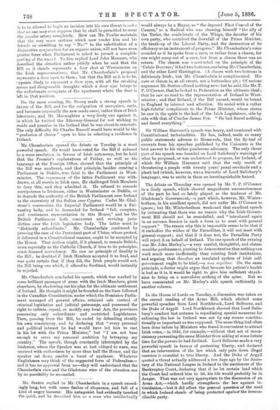Mr. Sexton replied to Mr. Chamberlain in a speech exceed-
ingly long, but with Berner flashes of eloquence, and full of a kind of angry: humour. His antagonist had evidently touched the quick, and he described him as a man who intellectually
would always be a Mayor, as " the deposed First Consul of the Caucus," as a Radical who was showing himself "the ally of the Tories, the confederate of the Whigs, the deserter of his own party, who contrived the downfall of the Prime Minister, the break-up of the Liberal Party, and the destruction of its efficiency as an instrument of progress." Mr. Chamberlain's voice sounded as if he spoke from a cave, or rather from a chasm, for one might creep out of a cave, but from a chasm there was no return. The chasm was constructed on the principle of the ' Calais- Douvres ;' it had two bottoms, one being Mr. Chamberlain, and the other Lord Hartington. (A chasm with two bottoms is deliciously Irish; but Mr. Chamberlain is complimented. His cave or chasm is, at all events, not a bottomless pit.) Of serious argument Mr. Sexton offered nothing new; but he said, like Mr. T. P. O'Connor, that he looked to Federation as the ultimate ideal ; that he saw no road to the representation of Ireland in West- minster ; and that Ireland, if the Bill passed, would be bound to England by interest and affection. He ended with a rather high-falutin' compliment to the Prime Minister, whose statue he saw in the spirit in the hall of the Irish Legislature, side by side with that of Charles James Fox. " He had feared nothing, and dared everything."


































 Previous page
Previous page